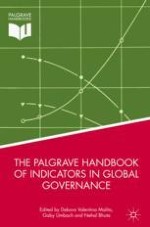2018 | OriginalPaper | Chapter
5. The Creative Disorder of Measuring Governance and Stateness
Author : Debora Valentina Malito
Published in: The Palgrave Handbook of Indicators in Global Governance
Publisher: Springer International Publishing
Activate our intelligent search to find suitable subject content or patents.
Select sections of text to find matching patents with Artificial Intelligence. powered by
Select sections of text to find additional relevant content using AI-assisted search. powered by
